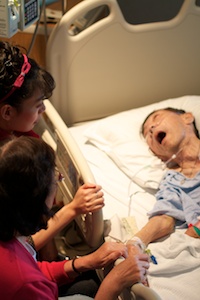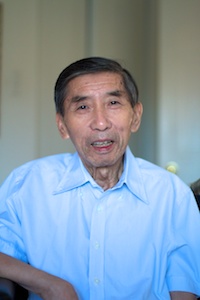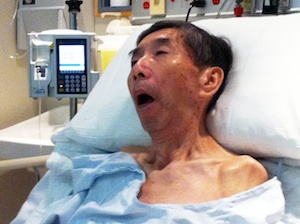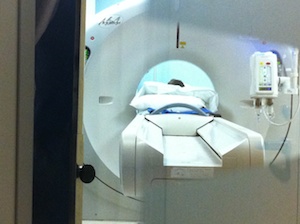Lately I’ve been thinking that I need to make some changes in my life. I am concerned about my stress levels. One of the biggest causes of stress is the organization of the 2012 Ted Powell Memorial Race weekend at Calabogie Motorsports Park. It’s been an uphill battle for months. There are many major issues that need to be resolved.
Additionally, I have felt unfocused and scattered. I need a way to find calm, learn to relax and focus, and deal with the issues at hand.
I also just finished reading Steve Jobs by Walter Isaacson. Steve practiced Buddhist meditation, although he did not seem to live a Buddhist life – he was a fantastically talented asshole. But he was also incredibly focused. I wondered if Buddhism was a key to that focus.
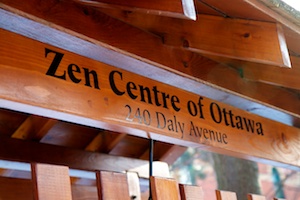
A week ago, I found that the White Wind Zen Centre was offering an Introduction to Zen Workshop, so I signed up after some hesitation. The course was today.
The information page asked the participants to wear comfortable, dark clothes that will not cut-off circulation while sitting. I gave this much thought and decided to buy a pair of medical scrubs. I always wanted a pair. When I was in high school the cool kids wore scrubs. I found that only one place in Ottawa sells scrubs so I headed there. They had many different colours but I chose a pair of black bottoms. They were so comfortable. They only had V-neck tops, which I am not comfortable wearing, so I had to find a top. I headed to the new Walmart on Baseline. The parking was a nightmare – they don’t appear to have enough spaces. I bought a simple dark-grey button-up shirt.
Then I left for downtown.
The White Wind Zen Centre is in Sandy Hill, surrounded by a tall hedge. It also has a monastic name: Honzan Dainen-ji. When I arrived, there were two other participants waiting outside on the porch. The centre is a heritage building with a large wrap-around porch. There was a small pond with a waterfall beside the Centre. There was a multitude of birds eating and bathing in the water. The biggest grey squirrel I have ever seen was exploring in the front yard. It was so peaceful; I could have just sat on the porch for hours taking in nature. At precisely 1:30PM, the front door was opened and one of the monks allowed us to enter. We had to remove our shoes and socks upon entering. I changed into my new purchases.
There were 6 participants. Our training was conducted by two monks. Both had cleanly shaved heads and wore simple dark tunics. We had a short introduction in the kitchen before we entered the zendo.
In the zendo or meditation room, we were introduced to the basics of zazen. This is a sitting practice. Everyone sits on a zabuton (like a large flat throw cushion) and zafu (round meditation cushion). During zazen it is important to sit up straight. The key is to form a stable base by creating a triangle with the butt and knees. For example, most people know the lotus or half-lotus position. I was not able to use either so I chose to tuck my feet behind the opposite knee. Our hands must also be positioned correctly.
Once everyone is seated, the zazen begins with three strikes on a bell. The zazen participant will breathe deeply and bow with the strikes.
Zazen is a 30-minute sitting meditation, with eyes open. One must experience all of the sensations. This includes the feeling of breathing, the feel of sitting, the feeling of your clothes, the sounds of the room and what you can see without looking around. It was important not to get lost in thought about the sensations. The purpose was just to experience the sensations without a mental commentary. The zazen ends with another strike of the bell.
Between the 30-minute zazen sessions was a 10-minute walking practice called kinhin. This is a slow walk around the periphery of the room. It also focused on the physical experience, including breathing, the feel of your feet on the wooden floor, the feeling of your clothes, the sounds and so forth.
The first two zazen were done facing the room. The last zazen was facing a wall, which is the normal (non-novice) practice. This was more difficult for me, as my eyes hurt. Although I was at the correct distance, my eyes strained to find focus on the white, textureless surface of the wall.
After three sessions of zazen and kinhin, we left the zendo and went to the kitchen for a question and answer session.
During the practice, I did not understanding the theory behind zazen and kinhin. I was expecting it would be more trance-like, an unguided daydreaming state. Instead we were told to focus on just the physical sensations and not on the mind.
It took a while to really understand this. The purpose is to attain mindfulness. There is much about our lives that are just ideas running around in our heads. Stress and worry are created only within ourselves. Although external influences cause us to feel bad, our emotions are only what we feel in our mind.
The first Buddha started with what is known as the First Noble Truth – that there is suffering and sorrow in the world. We experience pain and sorrow when we contemplate that our life is not as we wish it would be. Although we rarely think about it consciously, we are also afraid of our inevitable death. No matter how hard we wish it, it is not possible to achieve the life we desire for ourselves. The dichotomy is a source of internal suffering.
The Buddha concluded that suffering was not caused by the nature of the world, but rather our reaction to the dichotomy.
The Buddha realized that by being honest with oneself and understanding that everything is impermanent. Our possessions, our desires, our thoughts and our lives are fleeting on the scale of the universe. This understanding is the path to Buddhist enlightenment.
By concentrating on only the physical sensations available, zazen is a starting point to this understanding. Although we think we feel emotions and thoughts, in reality we can only sense (feel) our immediate physical surroundings. All else is created in our minds. This understanding comes from experiencing the physical world without an analysis in our minds.
The teachings of Buddha are much deeper than this, and include the Four Noble Truths and the Noble Eightfold Path. The course at the Zen Centre covered only the smallest fraction of Buddhism.
Now that I have taken the course, and have completed some supplementary reading, I need to think about this some more. I need to understand how this fits into my mental framework, and how I can incorporate what I find valuable. My goal is still to achieve a more balanced, focused life and to reduce the stress and worry that I feel.

